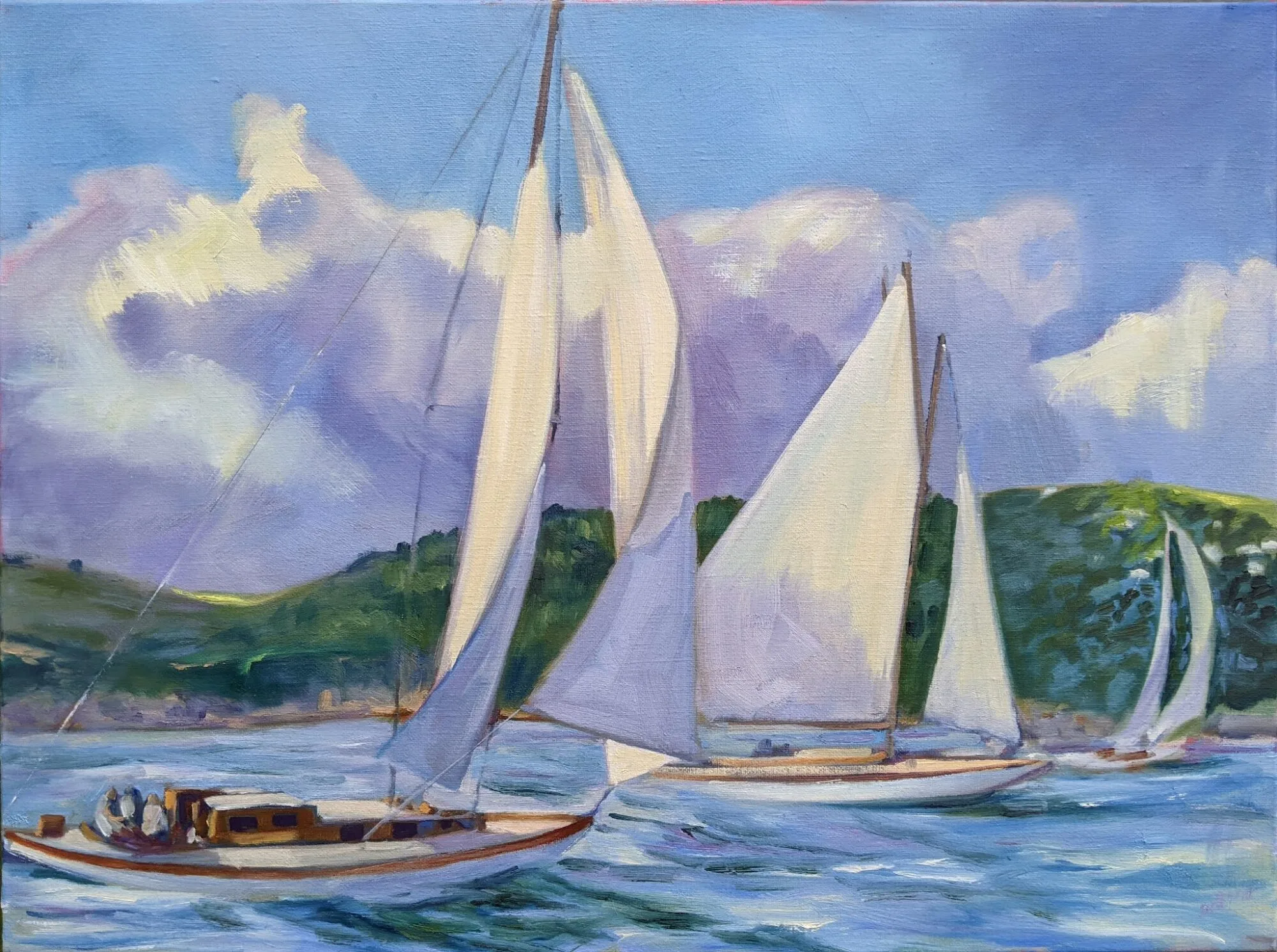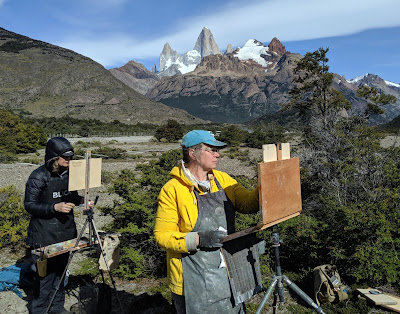May we all treat coronavirus as a chance to serve, rather than be served.
 |
| El Calafate, by Carol L. Douglas, 8X10, oil on canvas, available, if I can get it to you. |
On arrival at Buenos Aires last week, the flight attendant
announced a twenty-minute delay in disembarking. Nevertheless, people moved up the aisle, preferring to stand impatiently with their gear rather than wait quietly in their seats. If you fly frequently, you see this at the end of every flight. These people create traffic jams by attempting to jump the queue.
I am reminded of this by the current logjams at American airports, where thousands of citizens are penned up waiting to clear customs. Rather than add ourselves to the scrum, we’re waiting out our quarantine in El Chaltén. We check our temperatures daily, but otherwise we don’t panic.
 |
| Cerro Fitz Roy and Cerro Electrico, by Carol L. Douglas, 12X16, available. |
Argentina has internal checkpoints. These allow them to control the movement of their citizens in a way Americans would never tolerate. (Remember this when you’re complaining about our government’s response.) There is a city gate outside El Calafate where police stop and inspect traffic. Right now, Americans who haven’t completed quarantine are not permitted into the town. That means us.
 |
| Cerro Marconi, by Carol L. Douglas, 11X14, available. |
We are north of El Chaltén, on the edge of
Los GlaciaresNational Park. Like everything else in the world, the park is closed. Tellingly, the ranger who told us we cannot go into the park asked us to do nothing that would get
them in trouble. That,
Jane Chapin tells me, is a mark of how much Argentinians need jobs. We are, of course, respecting their request.
There are ten Americans in our party. While they will permit us to leave this district, we won’t be allowed back in. There’s a no-man’s land of about 215 km between El Calafate and El Chaltén, with no houses and no services. There are herds of wild vicuña, the occasional string of ranch horses, and spectacular views.The airport is outside the city gates of El Calafate, putting it in this no-man’s-land. When we decide it’s prudent to leave, we will present ourselves at this airport. If there’s no flight, we are effectively banished; we will not be allowed to return to either El Calafate or El Chaltén until the 26th of March.
 |
| Powerhouse, Rio Blanco, by Carol L. Douglas, 9X12, available. |
Needless to say, the only airplane tickets we have are useless. We had planned to fly to Ushuaia in Tierra del Fuego and then to Buenos Aires and then home. However, we can’t fly between provinces, and we don’t have tickets from El Calafate. Our international flight was cancelled days ago. We have—obviously—no idea how we’re going to get home.
This does not rise to any state of emergency. I have twenty painting boards left and I’m surrounded by glaciers and a lovely, peculiar kind of beech tree,
nothofagus pumilio. The proprietors here have figured out a way to give us limited connectivity. My kids are fine, so I’m content.
 |
| Glaciar Cagliero by Carol L. Douglas, 11X14, available. |
El Chaltén is a village of about 1700 people.
Hosteria el Pilar,where we are staying, is isolated along a high river, ringed by glaciers. It is a center for mountain climbing and trekking and a place to withdraw from the world. The village doctor has said that we should consider ourselves in quarantine here.
Innkeepers Guillermo and Cristina have been resilient and accommodating to their potentially plague-ridden guests. We are outstaying our welcome and they are figuring out a way to accommodate us, even though they were obviously not anticipating this. As we’re in an area which produces no crops, all supplies must be brought in. Guillermo has a rifle and it may get to the point where we’re potting rabbits for dinner. I can skin a rabbit.
Meanwhile, rumor runs rampant. Our own State Department has told us to listen to local authorities, and we’re doing our best. But I have internet and another twenty painting boards. I’m perfectly content.
You have heard the expression, “God is my co-pilot.” To me, that’s absurd. God is the pilot, and I’m just along for the ride. In John 9:1-3, Jesus is asked by his disciples why a man was blind. “Neither this man nor his parents sinned,” said Jesus, “but this happened so that the works of God might be displayed in him.” Adversity is an opportunity to panic, or it’s an opportunity to rise above oneself. May I have the strength to be a good witness. May we all treat coronavirus as a chance to serve, rather than be served.
















